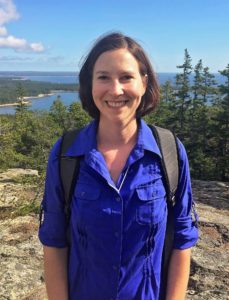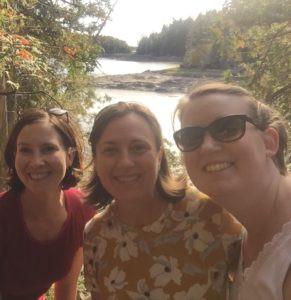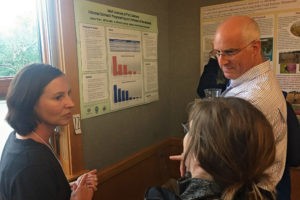Student writer Sabrina Robinson contributed to this story.

Lauren Vilen was working full-time at an environmental nonprofit in northwestern Minnesota when she decided she needed to pursue a master’s degree. During her eight years as a program manager in a community-based service-learning organization focused on educating and training young adults in environmental stewardship, Vilen developed and facilitated curricula on a variety of topics such as invasive species management, prairie restoration, prescribed burning and wildfire management, and leadership development. However, she felt she needed to learn more about adult training and gain research experience.
“I just really wanted to learn more, to gain more knowledge, and to improve my skills,” said Vilen.
As a nontraditional student, Vilen felt she needed to gain confidence before applying to a degree program, however. She took two classes to test the waters, which gave her the determination to apply to the Adult Education and Training online master’s program offered by the School of Education through CSU Online.
“I was really impressed with the backgrounds of the AET faculty,” said Vilen. “They are very diverse, and that was something I was looking for. That’s one thing that really drew me to CSU.”
Blending professional experience and coursework
As a student in the AET program, Vilen focused on environmental educators’ professional identity and development, increasing diversity in environmental organizations’ staff and participants, and developing and fostering an environmental identity in adults. She knew that her colleagues in environmental nonprofit organizations are often strong academics who may or may not have training in education, and made it her goal to study how to effectively teach professionals to become learning facilitators rather than simply a professional that occasionally needs to be an educator.
“I would say one of the biggest things that was reinforced for me throughout all of the classes was that education and learning is a part of everything we do, whether we’re conscious of it or not,” said Vilen. “That really is the end goal for me – I want to see more effective practices towards environmental and sustainability education. I think a key part of that is highlighting the importance of the learning aspect and the knowledge transfer, and how that plays out in the greater lens.”

Jill Zarestky, an assistant professor in the program, is one of Vilen’s biggest inspirations. Zarestky is an expert in educational human resource development and adult education who is currently part of a National Science Foundation grant research team examining the learning that takes place at biological field stations across the U.S. Vilen immediately gravitated toward Zarestky.
“I started volunteering on one of her research teams so I could gain more research experience, to kind of feel it out,” said Vilen. “She’s really helped me make a lot of connections with other faculty by going to conferences and introducing me to the community.”
“Lauren sought out additional opportunities to gain scholarly experience by working on an NSF-funded research project and traveling to an adult education winter school in Germany,” said Zarestky. “She brought professionalism and maturity as a nontraditional student. We were lucky to have her!”
Online meets in-person
While studying as a distance student, Lauren worked multiple part-time jobs, supporting herself and offering her the opportunity to apply what she learned to real-world situations.
“The online program gave me the flexibility of being able to work and go to school, while offering a variety of topics that could be tailored to my interests,” said Vilen.
She had many great experiences in the program, she said, but fondly remembers the one-week summer Experiential Learning seminars hosted at the CSU Mountain Campus as pivotal to her success and instrumental in building her confidence and comfort with her peers and the faculty.
“It’s one of the only opportunities for distance students to come and see each other face-to-face, and to meet faculty,” said Vilen. “I could definitely see a difference in myself after that, like how comfortable I felt communicating with faculty and the other students who had also been there. It just gave us another experience that we have in common, and we felt more like we’re a community with shared experiences.”
Pursuing future goals

Vilen’s time in the AET program and her work with both Zarestky and Leann Kaiser, an associate professor in the program, have inspired her to continue her education. Recently, Vilen was accepted into the School of Education’s Education, Equity and Transformation doctoral program – something she never pictured for herself before receiving support from the faculty in the AET program.
“I’m excited to come to Fort Collins and begin my doctoral studies in August,” said Vilen. “I never thought I would be here even two years ago. I’m just glad I was open to pursuing new experiences and challenging myself and having people that pushed me in that direction.”
Her success as a graduate student offers inspiration to other nontraditional students. For those who may be considering a return to academia, Vilen has the following advice:
“I would say, for those who are considering grad school, just try it! I’d been out of school for a long time, and there is that question of time management and academic confidence that maybe is prohibiting you from taking that leap. So I would say, if you’re not sure, take a couple classes and just see.”
The School of Education is part of CSU’s College of Health and Human Sciences.